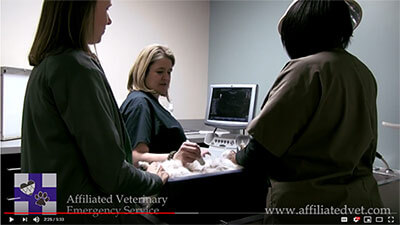Common Veterinary Emergencies
If your pet is having an emergency, please call us at (313) 389-1700.
If you are concerned about your pet, so are we. Never hesitate to call us if you have worries about your pet’s health or well-being. Our professional staff is trained and experienced in pet emergencies and will be happy to talk to you and answer your questions regarding your pet’s symptoms. Thankfully, most conditions your pet may be experiencing can be treated by your regular veterinarian during his/her normal business hours.
Is It An Emergency?
If your pet is experiencing any of the following symptoms, please call us immediately or bring your pet directly to our hospital. We always see the most seriously ill or injured pets first:
- Difficulty breathing, labored breathing, pale or blue gums or tongue. Something stuck in the mouth or throat.
- Bleeding that does not stop from any part of the body. For heavy bleeding, apply direct pressure to the wound, seek help immediately.
- Bloated, distended, swollen or painful abdomen.
- Major trauma – falls, hit-by-cars, large wounds, broken bones. Even if your pet is acting ok, please seek professional treatment immediately.
- Lacerations, bite wounds and penetrating wounds anywhere (but especially in the chest or abdomen). Many wounds that seem minor to the naked eye – a small puncture or bite wound – can often have deeper, more serious injuries below the skin’s surface.
- Collapse/Loss of Consciousness. Illness or injury may make a pet too weak to stand. Neurological problems can prevent normal movement and lead to greater injury if your pet tries to walk.
- Ingestion of poison or foreign material.
- Prolonged vomiting or diarrhea, vomiting or diarrhea with blood or violent episodes. Many serious illnesses begin with vomiting and/or diarrhea. Multiple episodes of vomiting and/or diarrhea can lead to severe dehydration and shock.
- Seizure activity.
- Staggering, stumbling, head-tilted, sudden blindness.
- Lameness or non-weight bearing on any limb.
- Inflammation, swelling or other irritation to the eye(s)
- Severe hives or severe itching.
- Inability to urinate or defecate. Your pet may appear to be straining due to constipation, but it could be more serious. Frequent attempts to urinate that don’t produce a normal urine flow could indicate infection or obstruction – especially in male cats! This can lead to uremic poisoning and death.
- Inability to deliver puppies or kittens.
- Loss of balance or consciousness.
- Pain
- Rapid heartbeat (in general, >160 for dogs, >200 for cats)
- Dilated pupils
- Eye problems. Redness, excessive tearing, pain, pawing at the eyes, squinting or eyelid spasms suggest an acute problem. The symptoms can intensify if not treated.
Emergencies include:
- Hit by a car or blunt object
- Falling more than a few feet
- Bite wounds
- Heavy bleeding
- Gaping wounds
- Bleeding from mouth, nose or eyes
- Unconscious or can’t wake up
- other conditions easily identified as requiring immediate attention

